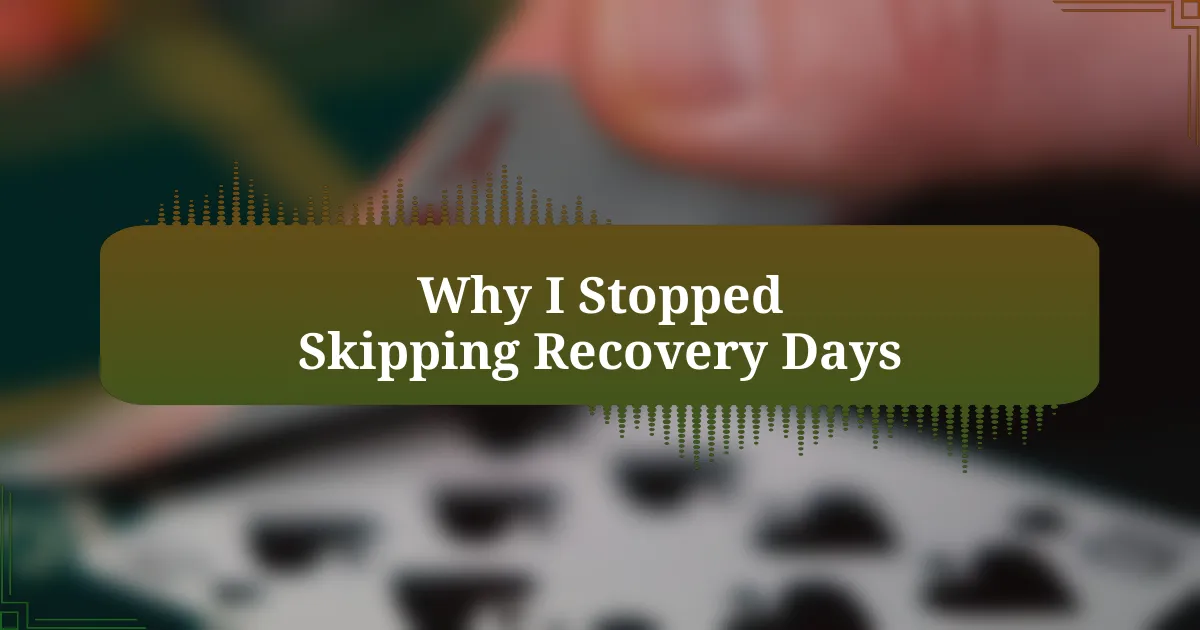Key takeaways:
- Recovery days are essential for athletes to rejuvenate both body and mind, preventing burnout and enhancing performance.
- There are common misconceptions that recovery indicates weakness, and it’s only for elite athletes; in fact, everyone, including amateurs, needs to prioritize recovery.
- Ignoring signs of fatigue and mental exhaustion can lead to injuries and decreased performance; recognizing these signs is crucial for long-term success.
- Embracing recovery fosters mental clarity and strategic planning, which can enhance overall approach and enjoyment of the sport.
Author: Evelyn Harper
Bio: Evelyn Harper is an award-winning author known for her evocative storytelling and rich character development. With a background in psychology, she weaves intricate narratives that explore the complexities of human relationships. Her debut novel, “Whispers in the Wind,” received critical acclaim and established her as a fresh voice in contemporary fiction. A graduate of the Iowa Writers’ Workshop, Evelyn resides in Portland, Oregon, where she continues to write and inspire aspiring authors through workshops and mentorship. When not immersed in her writing, she enjoys hiking the Pacific Northwest trails and sipping coffee at local cafes.
Understanding recovery days
Recovery days are often misunderstood but are crucial for any athlete, including amateur cricketers like us. I remember when I first started playing, I thought pushing through was the key to improvement. But those days off are what allow our muscles and minds to rejuvenate, preventing burnout and fatigue. Have you ever felt that lingering soreness after a game? That’s your body signaling it needs a break.
During my early playing days, I would hear seasoned players talk about recovery, but I didn’t grasp its importance until I faced an injury. I learned the hard way that neglecting rest can lead to longer recovery times than anticipated. It’s a humbling realization, isn’t it, when you find yourself sidelined because you were too eager to practice?
I’ve discovered that recovery days not only help the body but also clear the mind. On those days, I reflect on my performance, focusing on areas to improve without the pressure of physical exertion. Have you ever considered how stepping back can actually propel you forward in your game? Trust me, embracing recovery has transformed my approach to cricket and overall well-being.
Importance of recovery in sports
Recovery in sports isn’t just a luxury; it’s a necessity. I vividly remember a tournament where I pushed my limits, thinking I could power through fatigue. By the end of the week, my performance dwindled, and I felt drained. It was a tough lesson that recovery isn’t about laziness but about enabling my body to perform at its best. Have you noticed how champions often take strategic breaks?
There’s a psychological aspect to recovery that many overlook. On a recent recovery day, I took a long walk, allowing my mind to wander and reflect on my game strategies. Those moments of clarity were invaluable. It’s amazing how time away from the field can lead to breakthroughs in our approach and mindset. Have you ever experienced a sudden insight while doing something completely unrelated to cricket?
Moreover, I’ve come to appreciate the role of recovery in building resilience. A few months ago, after a taxing match, I decided to rest rather than train harder, and it paid off. I returned stronger and more focused. It’s not just about physical rest; it’s about respecting the process of growth. I ask you, how often do you consider the bigger picture of your development as a player?
Common misconceptions about recovery
Many people mistakenly believe that taking a recovery day is a sign of weakness or laziness. I remember chatting with a fellow amateur player who thought that pushing through pain would make him tougher. In reality, avoiding proper rest led him to multiple injuries, cutting his season short. When I think back to that conversation, it makes me wonder how many players fall into that same trap of misjudging strength.
There’s also a misconception that recovery only matters for elite athletes. I used to think that as an amateur cricketer, I didn’t need to focus on recovery as much as the professionals. However, after a grueling week of matches, I found myself struggling to maintain my skills. That experience taught me that regardless of your level, recovery is crucial for optimizing performance. Don’t you think that every player deserves to perform their best?
Another common myth is that recovery is just about lying around. I used to view it as unproductive time, but I later discovered the benefits of active recovery, like light jogging or stretching. Recently, I introduced yoga into my recovery routine, and the results were astounding. I felt more flexible and focused on the field. How often do you consider other activities that could enhance your recovery process?
My personal struggles with recovery
As I navigated my cricket journey, I encountered moments when I prioritized performance over recovery, and let me tell you, those were tough lessons. I vividly recall a match where I pushed through fatigue, only to find myself unable to bowl effectively and feeling defeated. The frustration of knowing I could have played better if I had listened to my body was discouraging and made me question my approach.
There were times when my stubbornness clouded my judgment, especially after a particularly intense game. I remember feeling guilty about taking a day off to recover, even though deep down I knew that rest could rejuvenate my spirit. Isn’t it odd how our minds can sometimes mislead us into thinking we need to keep hustling, even when all we really need is to recharge? I learned that overcoming this unhealthy mindset was as crucial as perfecting my batting technique.
I often grappled with the fear of falling behind my teammates if I took a break. While others were hitting the nets or running drills, I struggled to silence that nagging thought in my head. It wasn’t until I embraced the idea that recovery plays a vital role in long-term success that I began to respect those downtime moments. Reflecting on my experiences, I now see recovery as not just a pause but a powerful tool for growth on the field.
Signs I needed recovery days
Feeling increasingly fatigued after practices was one clear signal that I needed recovery days. There were times when I couldn’t shake off the tiredness, and even simple drills felt overwhelming. Have you ever tried to run a sprint while every muscle screamed for relief? That’s where I found myself, and it became painfully obvious that pushing through wasn’t a sign of strength, but rather a recipe for injury.
Another indicator emerged in my performance; I noticed inconsistencies in my game. I’d have days where my bat felt like a foreign object, and my bowling line wavered like I was trying to hit a moving target. It was perplexing. Why was my technique failing when I had practiced it so many times? Eventually, it struck me: my body was signaling that it needed a break, and ignoring that only exacerbated the problem.
I also found my mental clarity dwindling. It was as if my mind was clouded by a thick fog, making strategic decisions on the field feel like solving a complex puzzle under pressure. Reflecting on those moments, I realized they weren’t just about physical fatigue but also mental exhaustion. Could it be that true peak performance stems from both body and mind achieving balance? After all, how can you excel in a sport that demands your all if you’re running on empty?
Benefits of embracing recovery days
Embracing recovery days transformed my approach to the game, and the benefits became clear almost immediately. I remember the first recovery day I took after a particularly grueling week of practices. It felt odd at first—like I was slacking off—but then I discovered the revitalizing power of letting my body rest. I could feel the tension in my muscles ease, and the following practice, I played with a newfound energy and focus that completely reinvigorated my passion for cricket.
Moreover, I found that these break days were essential for injury prevention. Imagine pushing through intense workouts week after week without a moment to recuperate. It’s not just unsustainable—it’s a surefire way to face injuries that can sideline you for months. There was a time I ignored the warning signs, and I ended up with a strain that took longer to heal than I anticipated. The regret was palpable as I watched my teammates play, all because I didn’t listen to what my body was telling me.
Beyond physical benefits, recovery days also granted me valuable moments for mental clarity. I used to think rest days were wasted time, but they became opportunities for reflection and strategy planning. I’d sit quietly, perhaps in a park or with a good book, and think about how I wanted to improve my game. In these moments, I realized that giving my mind a break could ignite creativity and help refine my approach to both batting and bowling. How could I have missed that connection? Recovery days allowed me to step back and see the bigger picture, enhancing not just my performance on the pitch, but my overall enjoyment of the sport.


